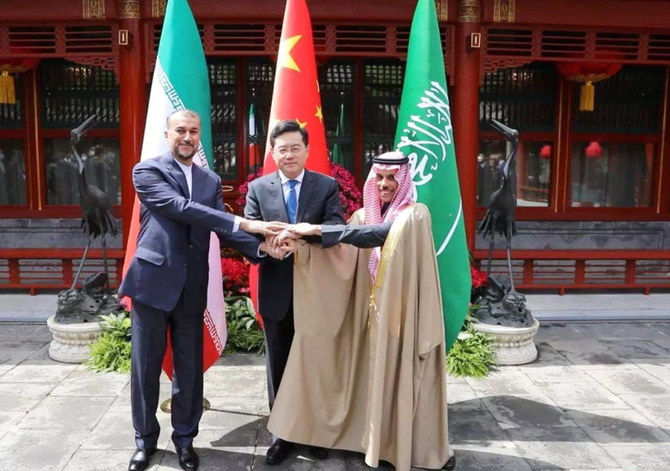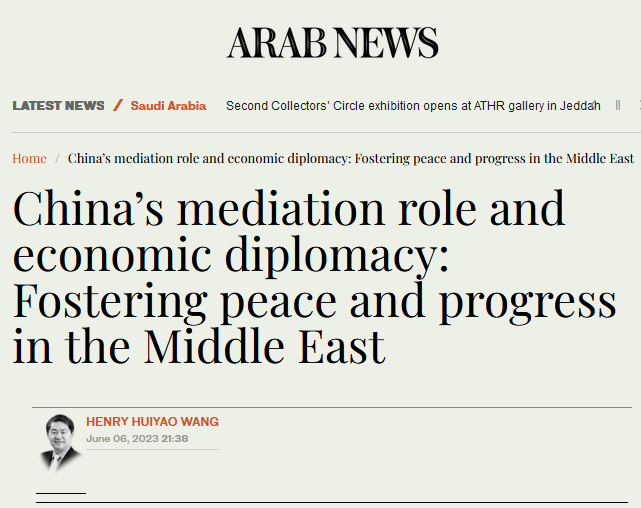China’s mediation role and economic diplomacy: Fostering peace and progress in the Middle East
June 06 , 2023 It is no coincidence that both Saudi Arabia and Iran enjoy substantial trade links with China. (Reuters)
It is no coincidence that both Saudi Arabia and Iran enjoy substantial trade links with China. (Reuters)
By Wang Huiyao | Founder of the Center for China and Globalization(CCG)
China’s position as the third-most-favored mediator among Palestinians according to an Arab News YouGov poll, trailing Russia and the EU, comes as no surprise. This ranking aligns with the perception of Palestinians and resonates with China’s fair stance and thoughtful contributions to peace in the Middle East. Notably, China played a pivotal role in brokering the Saudi-Iran rapprochement in March, underlining its commitment to fostering dialogue and reducing tensions in the region.
The thaw between Riyadh and Tehran highlights the importance of having a reliable and impartial mediator, rather than a major power flexing its muscles and overpowering smaller nations. It is evident that a mediator who operates in good faith, ensuring reliability and fairness, can inject new momentum into the process of easing hostility. China’s contribution, after hard work by Oman and Iraq, was instrumental in facilitating the resumption of diplomatic relations between Saudi Arabia and Iran.
The Middle East rightfully belongs to the people of the region, and its future should be determined by them. Irrespective of the complexity and challenges involved, a mutually acceptable solution can only be achieved through equal-footed dialogue based on mutual respect.
It is no coincidence that both Saudi Arabia and Iran enjoy substantial trade links with China. China holds the position of being the top trading partner of both nations, and it stands as the largest buyer of their oil. Recent years have witnessed the strengthening of these relationships through significant agreements, including the signing of a 25-year cooperation deal with Iran in 2021 and a comprehensive strategic partnership agreement with Saudi Arabia in 2022. These developments position China with unique persuasive power and a strong incentive to advocate for detente.
The re-establishment of diplomatic ties between Saudi Arabia and Iran is set to exert influence on regional developments. The widespread welcome from almost all regional countries is indicative of their belief that these agreements will contribute to political stability and economic development. The Saudi-Iran deal can be seen as a continuation of the ongoing process of Middle Eastern normalization, which has gained momentum in various dimensions, including intra-Gulf/Arab efforts.
Many regional countries have been actively diversifying their foreign relations, seeking to improve ties with different regional and global powers. This strategic approach aims to break dependencies on specific global powers and enhance autonomy in decision-making.
From the perspective of the Chinese people, the turbulence in the Middle East, including the Palestine-Israel conflict, is seen as a legacy of the problematic geopolitical order established during the era of colonialism. The imperial powers partitioned the Middle East, reshaped political maps, and reduced the region to a provider of oil pipelines and gas stations — largely for just a few. The historical reality of the Middle East, reinforced by international power structures, continues to shape the challenges faced today.
China’s approach to the Middle East is informed by its own history, marked by a period of humiliation in the 19th and 20th centuries. The lessons learned have guided China to avoid repeating such experiences and to refrain from imposing its will on others, particularly through force or coercion.
China unequivocally rejects the replication of failed interventionist approaches pursued by others. It instead seeks neutral engagement with all parties based on mutually beneficial agreements, coupled with empathy. China established formal diplomatic relations with Palestine in 1988, preceding its relations with Israel by four years. In 2013, China presented a four-point proposal emphasizing the importance of an independent Palestinian State, peaceful coexistence between Palestine and Israel, and the establishment of a sovereign Palestine state based on the 1967 borders, with East Jerusalem as its capital — a right inherent to the Palestinian people.
The recent escalation of the Palestine-Israel conflict serves as a stark reminder of the pressing need to address the Palestinian question. The international community must prioritize this matter, placing it high on the international agenda. A steadfast commitment to the two-state solution, advocating for the early resumption of peace talks, and addressing the legitimate aspirations of the Palestinian people are essential steps toward realizing their dream of establishing an independent Palestinian state.
China’s vested interest lies in witnessing a peaceful and prosperous Middle East. With its expanding economy and trade relationships, China has become a vital partner to countries in the region. China’s Belt and Road Initiative spans the Middle East and seeks to contribute to much-needed infrastructure development that will benefit participating countries, including China itself, in the long run.
China has said that it does not intend to change the existing international order, nor to challenge or displace the US. Instead, China aims to foster development, including complementing domestic and international development programs throughout the Middle East. At a time when the West experiences fatigue with Middle East affairs, China’s substantial investments, trade and aid provide public goods that foster development and stability in the Middle East.
In the aftermath of prolonged turmoil in the region, a developmental approach to peace-building is worth exploring. Addressing the root causes of regional insecurity, such as economic stagnation, high unemployment, inadequate infrastructure, rapid population growth and brain drain, should take precedence over exporting governance models. Expanding mutually beneficial trade and investment, facilitating economic assistance, and prioritizing sustainable development are paramount for achieving long-lasting peace in the Middle East.
Topical News See more








